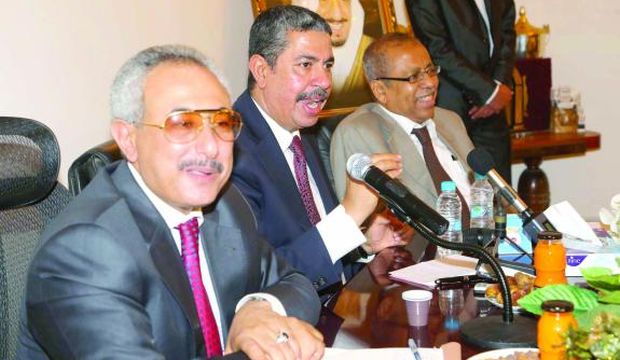
Yemen’s Prime Minister and Vice President Khaled Bahah (C) speaks to reporters in Jeddah, Saudi Arabia, alongside Yemen’s ambassador to the Kingdom Ali Al-Ayashi, on May 24, 2015. (Asharq Al-Awsat/Salman Al-Marzouqi)
Jeddah, Asharq Al-Awsat—UN-sponsored peace talks between Yemen’s internationally recognized government and the Shi’ite Houthi movement in control of large parts of the country have been postponed, the UN has confirmed.
UN officials have not divulged why the meeting, scheduled for Thursday in the Swiss city of Geneva, will not take place at the scheduled date but sources speaking to Asharq Al-Awsat said Yemen’s President Abd Rabbuh Mansur Hadi is insisting the Houthis abide by the UN Security Council’s Resolution 2216 on Yemen as a condition for him and his government speaking with the Houthi leadership.
The sources said that during a meeting in the Saudi capital Riyadh on Sunday Hadi told the UN’s envoy to Yemen Ismail Ould Cheikh Ahmed the Houthis must pull out of the capital Sana’a and other areas of the country under their control before the Yemeni government can sit down with them at the negotiating table.
As well as stipulating the Houthis withdraw from these areas, Resolution 2216 also demands that the Iran-backed group cease all acts of aggression against the Yemeni people.
The Houthis launched a coup in February, ousting Hadi and Yemen’s internationally recognized government after a months-long occupation of the capital Sana’a by the group’s militias.
Both Hadi and Prime Minister, and now also Vice President, Khaled Bahah were placed under house arrest by the group in Sana’a.
However, both men eventually fled to the southern port city of Aden, and Hadi later headed to Saudi Arabia to ask the Kingdom and its Arab allies to intervene militarily to restore political legitimacy to Yemen in the face of the Houthi advance across the country.
Operation Decisive Storm, led by Saudi Arabia, began targeting the group with a month-long aerial campaign on March 26.
A ceasefire has since been declared to allow humanitarian aid to enter the country—with Saudi Arabia pledging a half-billion US dollars to the country’s people—but reports suggest fighting has continued as the Houthis continue to flout the truce.
A conference involving all Yemen’s political factions was held earlier this month in Riyadh to try to find a political solution to the crisis, but the Houthis did not attend, despite being invited to do so.
Premier and Vice President Bahah told Asharq Al-Awsat on Sunday that the outcomes of the conference would form the “cornerstone” of any future work on rebuilding the country’s political future.
In reference to the Houthis, he said “those who did not attend are the ones who seek to make mischief in our country.”
The conference stipulated sticking to the outcomes of the Gulf Initiative on Yemen, held following former president Ali Abdullah Saleh’s ouster in 2012.
The Gulf Cooperation Council (GCC)-sponsored initiative stipulates the restructuring of Yemen’s parliament and consultative assembly and the splitting of the country into six federal regions.
Mohammed Al-Aidh contributed additional reporting from Jeddah.
